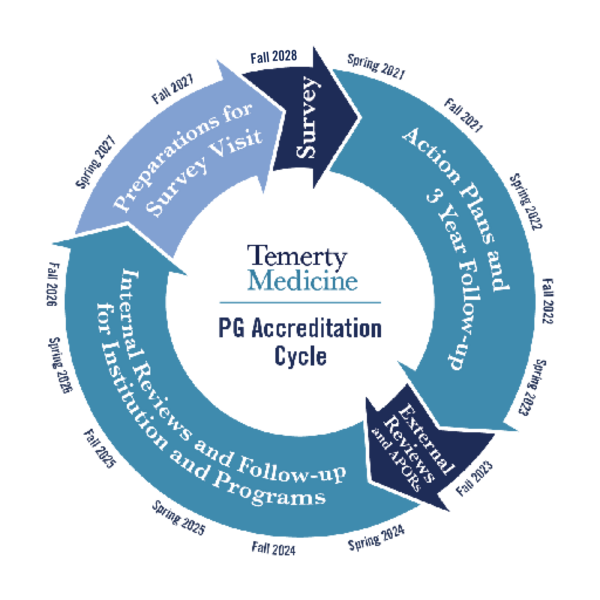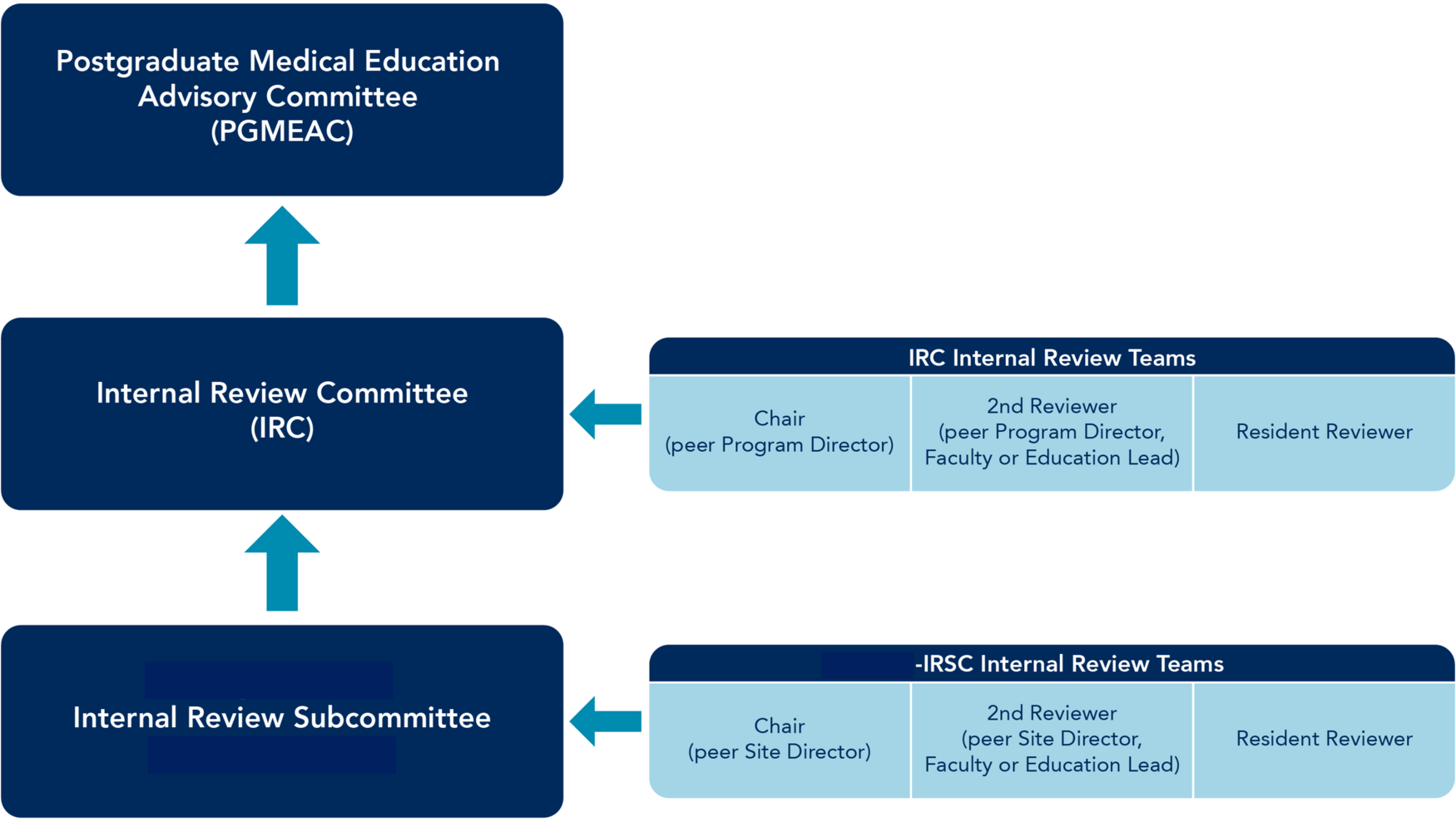Main Second Level Navigation
- Accreditation
- Area of Focused Competence (AFC) Diploma Programs
- Community Preceptor Payments
- Electives System
- Fellowship Resources
- Job Descriptions: Program Staff
- Medical Education Administrators' Information Sessions
- Office of Learner Affairs
- Registration and Learner Resources
- Residency Resources
- The PGME Post
Breadcrumbs
- Home
- Department & Program Resources
- Accreditation
Accreditation
New Accreditation Standards for Residency Programs Effective July 1, 2024
New accreditation standards for residency programs will come into effect starting July 1, 2024. Below is a summary of these standards listing how PGME will assist in their implementation and/or how programs might demonstrate compliance.
If you have any questions about these requirements, please contact pgme.accreditation@utoronto.ca.
Requirement 1.2.2: The residency program committee has a clear mandate to manage and evaluate the key functions of the residency program.
Indicators
- New 1.2.2.2: The terms of reference for the residency program committee are regularly reviewed and refined, as appropriate.
- New 1.2.2.4: The residency program committee documentation describes how it fulfills its mandate effectively.
Notes
- Include the upcoming review date at the bottom of your program’s RPC Terms of Reference and Competence Committee Terms of Reference documents.
Requirement 2.1.1: The residency program committee has well-defined, transparent, and effective policies and processes to manage residency education.
Indicators
- New 2.1.1.1: There is an effective mechanism to review and adopt applicable institution and learning site policies and processes.
- New 2.1.1.3: There is an effective mechanism to disseminate the residency program’s policies and processes to residents, teachers, and program administrative personnel.
- New 2.1.1.4: All individuals with responsibility in the residency program follow the institution’s policies and procedures regarding ensuring appropriate identification and management of conflicts of interest.
Notes
- PGME sends new and updated policies to all Program Directors and Program Administrators following PGMEAC meetings where they are approved. Updated policies from both PGME and hospital sites should be presented to your RPC and shared with individuals in the program.
Requirement 3.2.2: The residency program uses a comprehensive curriculum plan, which is specific to the discipline, and addresses all the CanMEDS/CanMEDS-FM Roles.
Indicators
- New 3.2.2.5: The curriculum plan includes educational programming to develop skills around physician wellness at various stages of the physician life cycle.
- New 3.2.2.6: The curriculum plan includes fatigue risk management, specifically, education addressing the risks posed by physician impairment to the practice setting, and the individual and organizational supports available to manage the risk.
Notes
- The PGME Curriculum Committee is collaborating with the Office of Learner Affairs to develop a wellness module/curriculum and is also collaborating with programs to develop resources on fatigue risk management. These will be shared with all programs so that you can customize and adapt them to your context.
Requirement 3.4.3: There is a well-articulated process for decision-making regarding resident progression, including the decision on satisfactory completion of training.
Indicator
- New 3.4.3.4: The competence committee, assessment committee, or equivalent body is able to access resident assessment data in a way that supports its recommendations and decision-making about resident progress in alignment with assessment guidelines.
Notes
- For programs in Competence by Design (CBD), your Elentra dashboards should be sufficient for your EPAs and are available to your Competence Committee members. For other assessments and non-CBD programs, other platforms may be in use to provide this information to each committee member in advance of the meetings.
Requirement 5.1.2: Residency education occurs in a physically, psychologically, culturally, and professionally safe learning environment.
Indicators
- New 5.1.2.3: Well-defined, transparent, and effective policies and processes are in place addressing residents’ psychological safety.
- New 5.1.2.4: Well-defined, transparent, and effective policies and processes are in place addressing residents’ cultural safety.
- New 5.1.2.5: Well-defined, transparent, and effective polices and process are in place addressing residents’ professional safety.
- New 5.1.2.6: Policies and processes regarding resident safety consider discipline, program, resident, and culturally specific contexts.
Notes
- PGME is in the process of updating our safety guidelines to ensure that they include physical, psychological, cultural, and professional safety. These will be shared with programs so that your RPC can adopt and update them to include discipline and program specific contexts.
Requirement 7.1.1: Teachers are regularly assessed and supported in their development.
Indicator
- New 7.1.1.6: The residency program identifies and addresses priorities for faculty development within residency training.
Notes
- When identifying faculty development needs, consider using/incorporating the central resources available for faculty development that programs and departments can access. RPCs can review these materials and also potentially identify new priorities for faculty development.
Accreditation Standards
The Canadian Residency Accreditation Consortium (CanRAC), a partnership of the Royal College of Physicians and Surgeons of Canada, the College of Family Physicians of Canada, and the Collège des Médecins du Québec, has developed Institution, Program-, and Discipline-Specific accreditation standards:
- General Standards of Accreditation for Institutions with Residency Programs (July 2021)
- General Standards of Accreditation for Residency Programs (July 2024)
- General Standards of Accreditation for Areas of Focused Competence Programs (2019)
- Discipline Specific Standards for Royal College Programs
- Discipline Specific Standards for Family Medicine
- Policy on Appointing a Program Director of a Royal College Accredited Program
All institutions and their residency programs are held to the general and discipline-specific accreditation standards in place one year in advance of the relevant accreditation activity (i.e., regular accreditation review, external review, action plan outcomes report). The accreditation standards are typically updated on an annual basis.
For detailed information on CanRAC and its procedures for accrediting residency education in Canada, please refer to the CanERA Policy Manual for the Accreditation of Canadian Residency Institutions and Programs.
New Accreditation Program Evaluation (APE) Self-Study Document
In the previous internal review cycle, programs were required to complete two documents: a self-study document and an Accreditation Questionnaire. In the current cycle, these have been combined into a new document called the Accreditation Program Evaluation (APE). The APE is organized so that programs can describe how they meet each of the accreditation indicators, which they are evaluated against during both the internal and external review. The PGME team has pre-populated the APEs using the information programs provided during the 2020 accreditation visit. Workshops are available for Program Directors and Program Administrators, as well as one-on-one working sessions with the PGME team to help programs update their APEs in advance of their internal reviews. The RPC will use the APE to assess adherence to the standards over time, fostering a process of continuous improvement, while internal reviewers will add information from their document reviews and interviews to the APE.
How We Will Support Programs
- Regular Updates and Communication: Information about the development and dissemination of central guidelines will be provided regularly.
- Pre-populating the APE: Information from previous accreditation documents will be transferred into the new APE format prior to programs receiving the document.
- Access to Materials: APEs are shared with programs on SharePoint along with the most recent versions of curriculum maps, rotation plans, and other relevant documents that PGME has on file.
- Workshops: Workshops and one-on-one sessions will be conducted to assist with building and completing the APE.
- Future Integration: PGME will transfer the information from the program’s APE into the CanRAC Accreditation Questionnaire to prepare for the 2028 accreditation visit.

The Internal Review Process
All residency programs and AFC training programs go through the internal review process. This multi-year process takes place within the 8-year accreditation cycle and begins approximately 3 years after the on-site survey. It continues until all residency and AFC programs are reviewed at least once, and any necessary follow-up activities (e.g., action plan outcome reports, external reviews, follow-up reviews, written reports, resident reports) are completed. The internal review cycle also includes a review of the PGME Office by external faculty.
Internal reviews are mandatory for accreditation as per the institutional standards. At the University of Toronto, these reviews promote continuous improvement by evaluating educational experiences, the learning environment, and available resources using various data sources, supporting program evaluation by identifying strengths and areas for improvement. For an overview of the layers of program evaluation in accreditation, please refer to the document PGME Accreditation - 3 Layers of Program Evaluation.
Internal Review Committee
The internal review process is overseen by the Internal Review Committee (IRC), the Family Medicine Internal Review Subcommittee (FM-IRSC), the Areas of Focused Competence Internal Review Subcommittee (AFC-IRSC), and the Postgraduate Medical Education Advisory Committee (PGMEAC). Customized reports on internal review findings are provided to departments and sites throughout the accreditation cycle.
Click here for IRC Terms of Reference

The Accreditation Management System (AMS)
CanRAC has built an online Accreditation Management System (AMS) to help facilitate the process for surveyors to review documents in preparation for an on-site survey. The system can also be used to manage program documents throughout the 8-year accreditation cycle. All Program Directors and Program Administrators have access to the AMS.
Transitioning to Competence By Design (CBD)
Programs are in various stages of Competence by Design planning and implementation. PGME will continue to work with programs on a case-by-case basis to ensure that the documentation provided for your accreditation activities reflects the status of your program.
For additional information on the continued roll out of Competence by Design at the University of Toronto, please visit the CBD website.
General Resources and Templates
PGME Accreditation team will update and add residency training program resources, as they become available: (examples below)
- RPC, CC, FM-RPC, FM-CC, Terms of reference templates
-
Policies & Guidelines
-
Residency Program Committee (RPC) - Best Practices
-
Competence By Design Technical Guides
-
Links to various workshops:
Areas of Focused Competence (AFC) Programs
The Areas of Focused Competence (AFC) Diploma Programs are a new category of fellowship programs that are accredited by the Royal College of Physicians and Surgeons of Canada. In addition to residency training programs, all AFC programs are part of the accreditation cycle, undergoing external reviews, internal reviews, and follow-up as needed. For additional information related to AFC programs, please visit the AFC webpage.
Contact Us
If you require any further information or have any accreditation related questions, please contact pgme.accreditation@utoronto.ca.